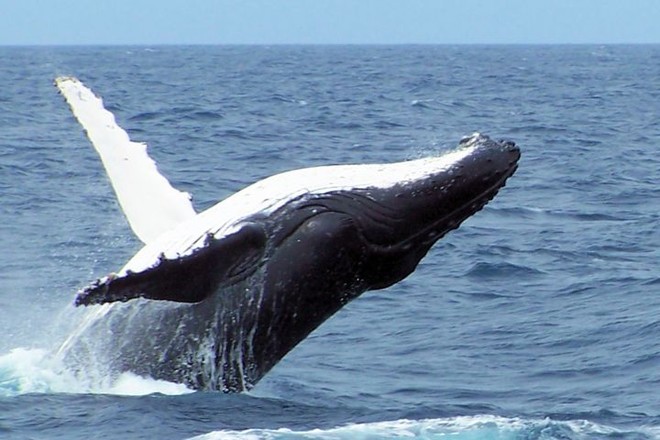Humpback whale subspecies revealed by genetic study
by Dr Jennifer Jackson on 31 May 2014

Humpback whale Dave and Fiona Harvey
A new genetic study has revealed that populations of humpback whales in the oceans of the North Pacific, North Atlantic and Southern Hemisphere are much more distinct from each other than previously thought, and should be recognised as separate subspecies. Understanding how connected these populations are has important implications for the recovery of these charismatic animals that were once devastated by hunting.
The team, led by scientists from the British Antarctic Survey and Oregon State University, analysed the largest and most comprehensive genetic dataset so far compiled for this iconic species. The findings, published in Proceedings of the Royal Society B this week, show that humpback whales of the North Pacific, North Atlantic and Southern Hemisphere are on independent evolutionary trajectories.
Known for their amazing acrobatics, humpback whales annually undertake the longest migration of any mammal between their winter breeding grounds and summer feeding grounds. Although they travel vast distances, it appears their populations do not cross paths.
Lead author, Dr Jennifer Jackson of the British Antarctic Survey explains:
'Despite seasonal migrations of more than 16,000 km return, humpback whale populations are actually more isolated from one another than we thought. Their populations appear separated by warm equatorial waters that they rarely cross.
'The colour of the bodies and undersides of the tail (the ‘flukes’) of humpback whales in the northern oceans tend to be much darker than those in the Southern Hemisphere. Until this study we didn’t realise that these kinds of subtle differences are actually a sign of long-term isolation between humpback populations in the three global ocean basins.
'Using genetic samples, collected from free-swimming whales with a small biopsy dart, we’ve been able to look at two types of humpback DNA; the ‘mitochondrial’ DNA which is inherited from the mother, and the nuclear DNA which is inherited from both parents. The mitochondrial DNA allows us to build up a picture of how female humpbacks have moved across the globe over the last million years. The nuclear DNA, which evolves more slowly, provides us with a general pattern of species movements as a whole.
'We found that although female whales have crossed from one hemisphere to another at certain times in the last few thousand years, they generally stay in their ocean of birth. This isolation means they have been evolving semi-independently for a long time, so the humpbacks in the three global ocean basins should be classified as separate subspecies. This has implications for how we think about their conservation and recovery on a regional scale.
'Further genetic sequencing and analysis should also help us to understand more about the pattern of humpback migrations in the past. Big changes in the ocean can leave signatures in the genetic code of marine species. For example, the last glacial maximum caused many to shift southwards until the ice retreated or to find ice-free areas in the north. Humpbacks are excellent oceanographers; they go where the food is and can travel long distances to get it, so their patterns of past migration can tell us a lot about the ocean thousands of years ago.'
This research brought together researchers from the British Antarctic Survey, Oregon State University, Florida State University, James Cook University, University of Auckland, Fundacion CEQUA, Wildlife Conservation Society, the American Museum of Natural History and the South Pacific Whale Research Consortium, with funding from the New Zealand Royal Society Marsden Fund and the Lenfest Ocean Program.
If you want to link to this article then please use this URL: www.sail-world.com/122760